Unit 4 Body language-Grammar
文档属性
| 名称 | Unit 4 Body language-Grammar | 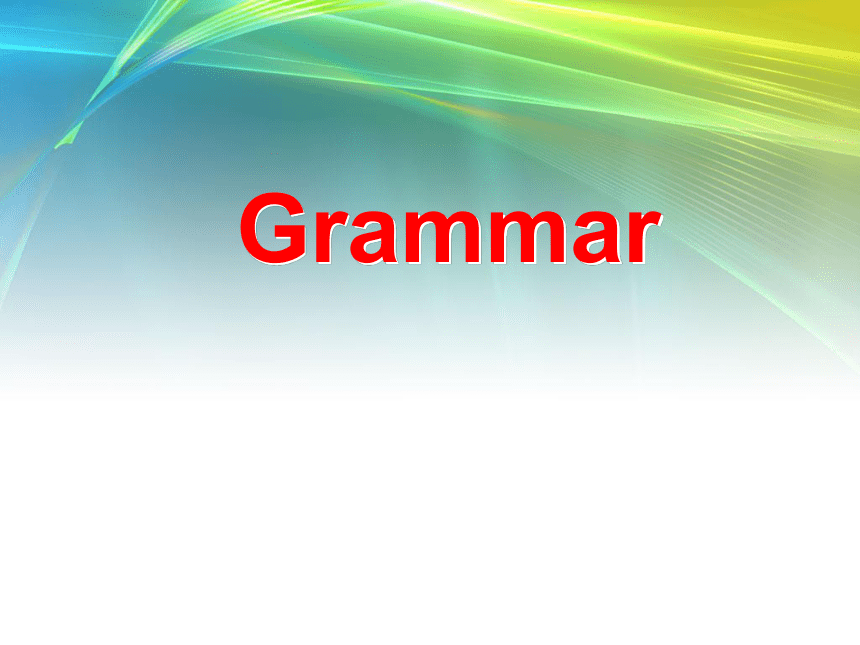 | |
| 格式 | rar | ||
| 文件大小 | 1.2MB | ||
| 资源类型 | 教案 | ||
| 版本资源 | 人教版(新课程标准) | ||
| 科目 | 英语 | ||
| 更新时间 | 2011-12-09 11:55:15 | ||
图片预览

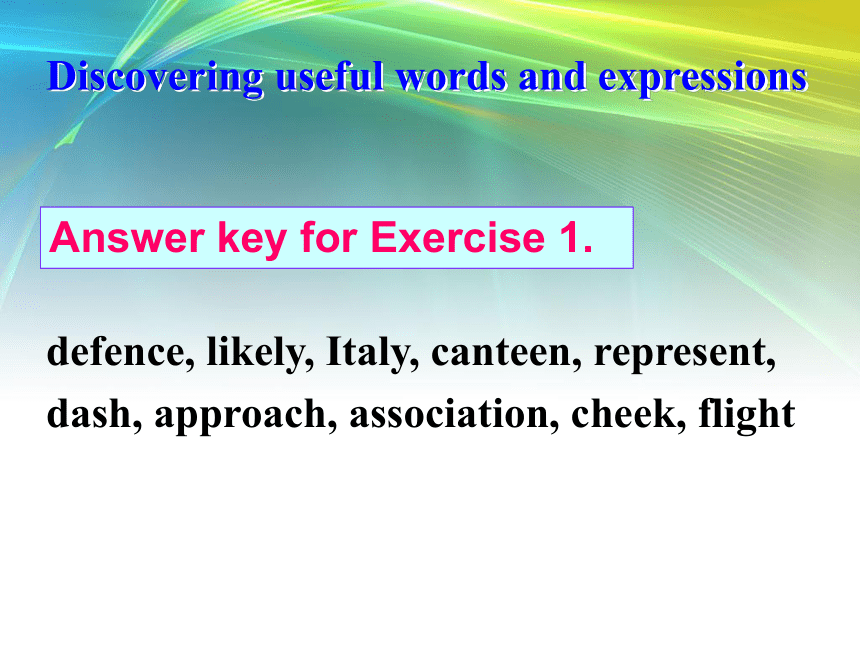
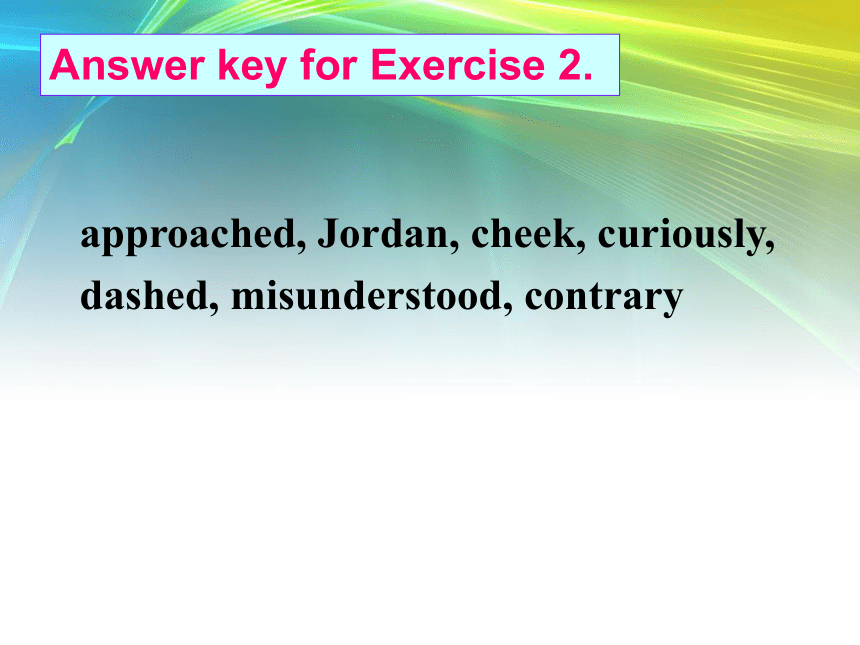
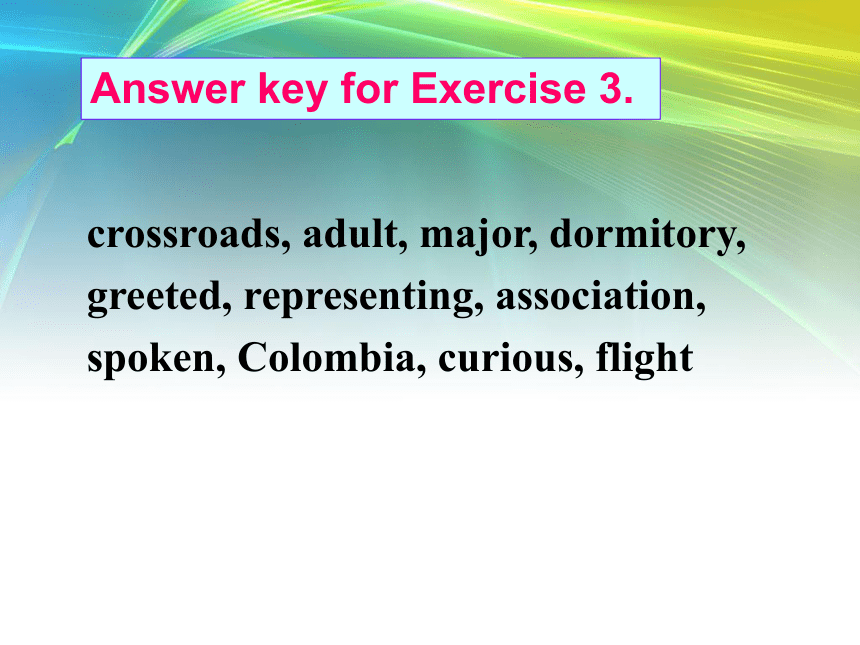
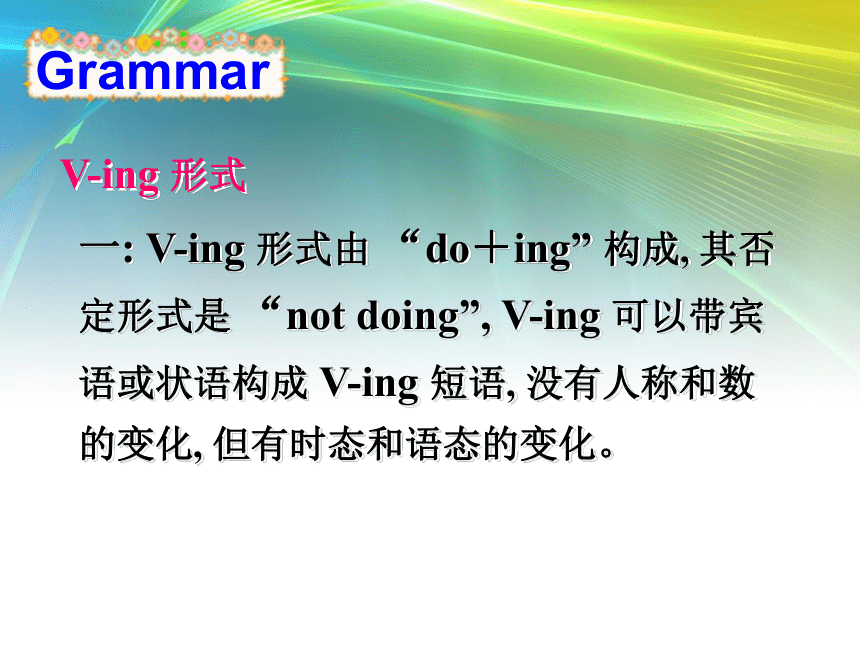
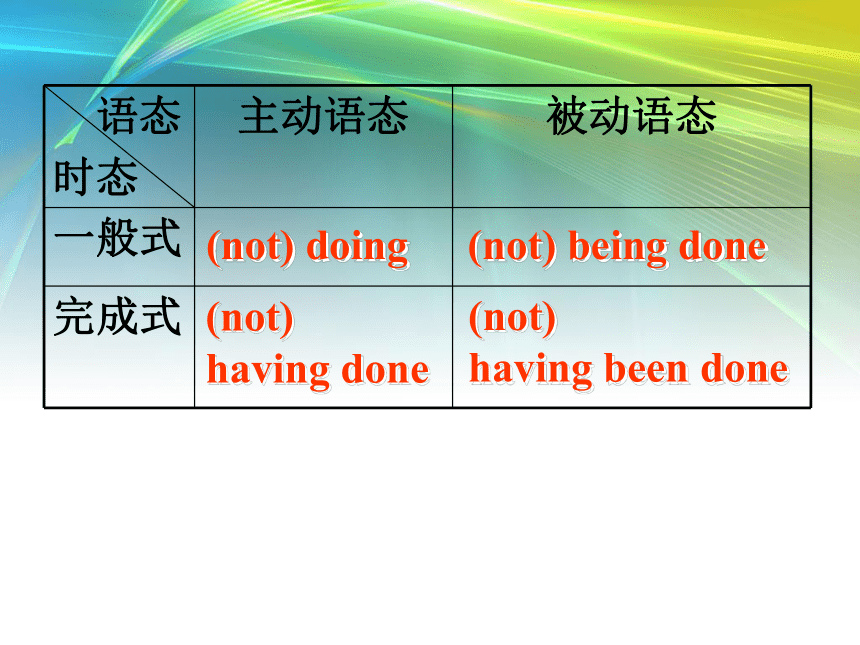
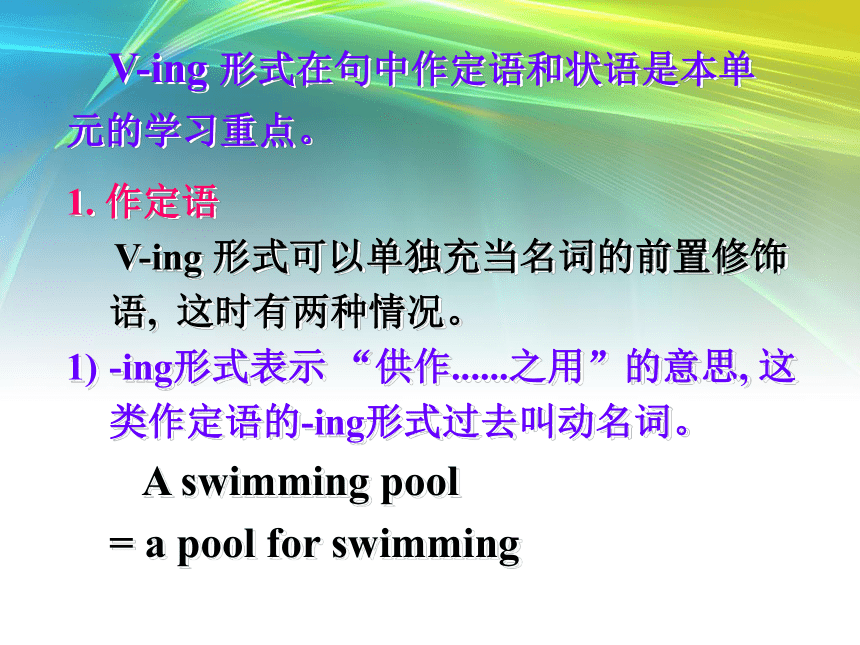
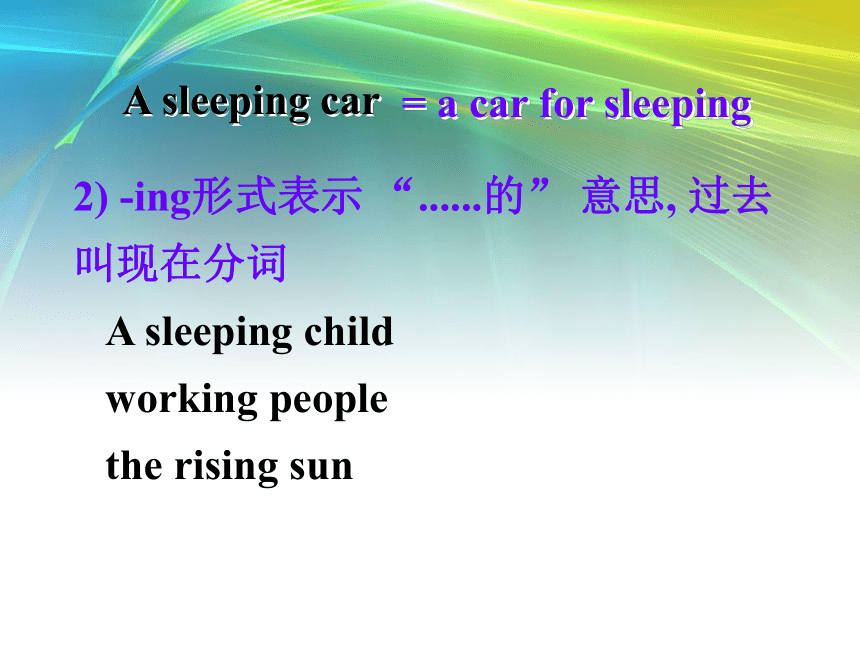
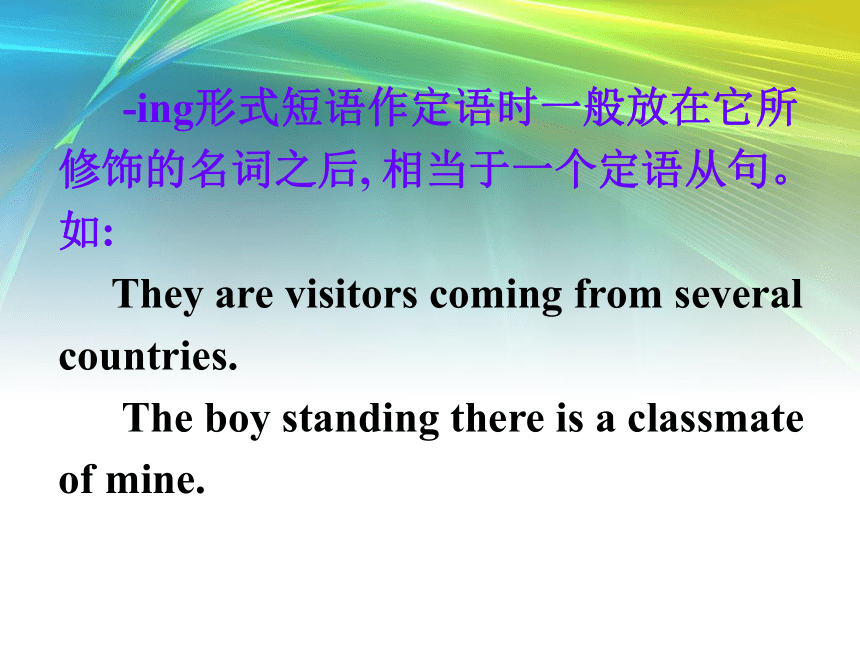
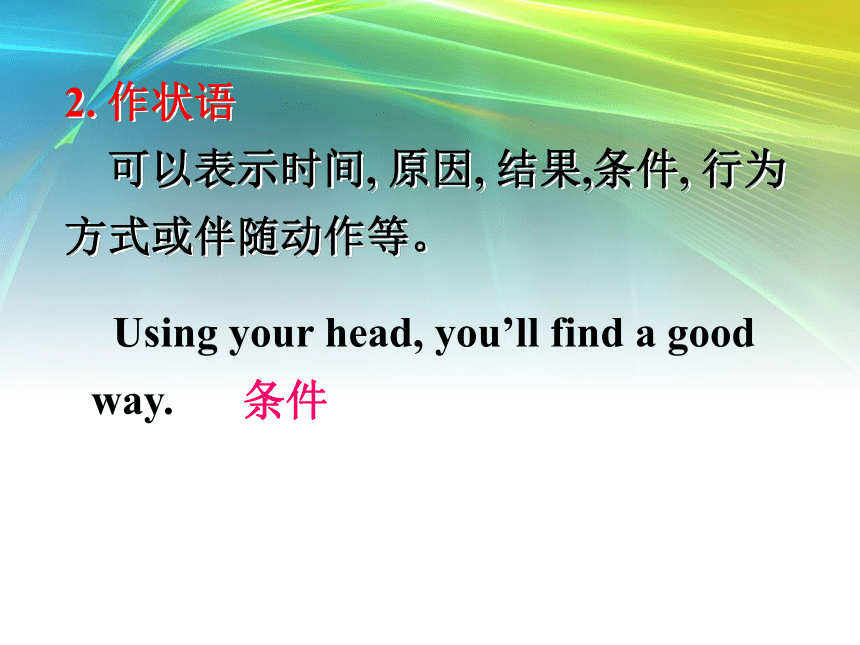
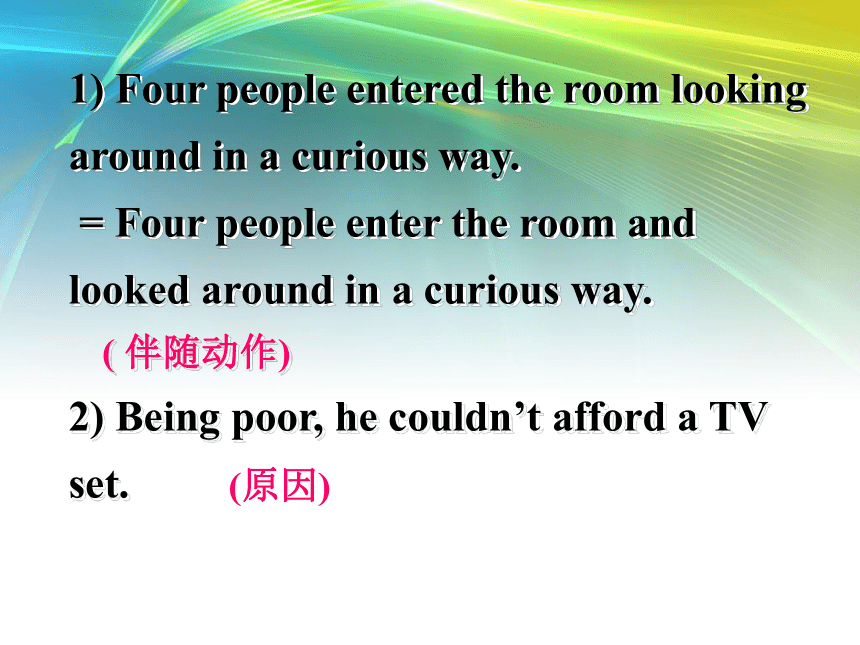
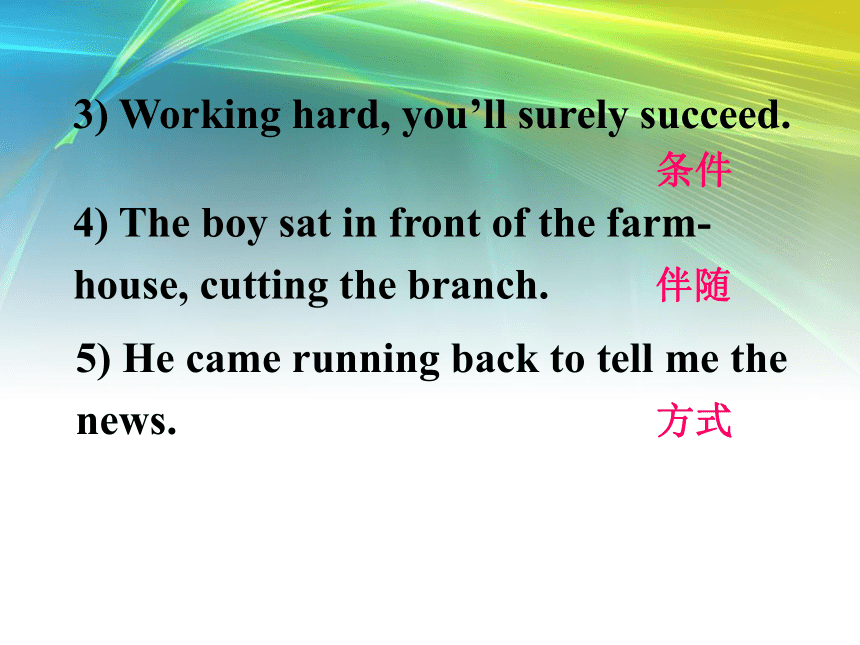
文档简介
(共31张PPT)
Grammar
Answer key for Exercise 1.
defence, likely, Italy, canteen, represent,
dash, approach, association, cheek, flight
Discovering useful words and expressions
Answer key for Exercise 2.
approached, Jordan, cheek, curiously,
dashed, misunderstood, contrary
Answer key for Exercise 3.
crossroads, adult, major, dormitory,
greeted, representing, association,
spoken, Colombia, curious, flight
一: V-ing 形式由 “do+ing” 构成, 其否定形式是 “not doing”, V-ing 可以带宾语或状语构成 V-ing 短语, 没有人称和数的变化, 但有时态和语态的变化。
Grammar
V-ing 形式
语态
时态 主动语态 被动语态
一般式
完成式
(not) doing
(not) being done
(not)
having done
(not)
having been done
V-ing 形式在句中作定语和状语是本单元的学习重点。
1. 作定语
V-ing 形式可以单独充当名词的前置修饰语, 这时有两种情况。
-ing形式表示 “供作......之用”的意思, 这类作定语的-ing形式过去叫动名词。
A swimming pool
= a pool for swimming
A sleeping car
= a car for sleeping
2) -ing形式表示 “......的” 意思, 过去叫现在分词
A sleeping child
working people
the rising sun
-ing形式短语作定语时一般放在它所修饰的名词之后, 相当于一个定语从句。如:
They are visitors coming from several countries.
The boy standing there is a classmate of mine.
2. 作状语
可以表示时间, 原因, 结果,条件, 行为方式或伴随动作等。
Using your head, you’ll find a good way.
条件
1) Four people entered the room looking around in a curious way.
= Four people enter the room and looked around in a curious way.
( 伴随动作)
2) Being poor, he couldn’t afford a TV set.
(原因)
3) Working hard, you’ll surely succeed.
条件
4) The boy sat in front of the farm-house, cutting the branch.
伴随
5) He came running back to tell me the news.
方式
6) (When) Hearing the news, he got frightened.
= When he heard the news, he got frightened.
(时间, 可以在分词前保留when )
7) The child slipped and fell, hitting his head against the door.
结果
Attention Please
-ing形式作状语时, 它的逻辑主语必须与主句的主语是一致的。
Time permitting, I will pay a visit to the whole city.
(分词的逻辑主语是time , 而句子的主语是I , 两者不构成主谓关系, 所以只能用独立主格结构, 也就是给现在分词补充一个主语。)
the British lady
the Columbian
the Japanese
the Canadian
You see her step back appearing surprised.
His nose touches Mr. Cook’s moving hand.
You see her step back appearing surprised.
= You see her step back and she appears surprised.
They also express their feelings using unspoken language.
=They also express their feelings by the way of using unspoken language.
His nose touched Mr. Cook’s moving hand.
=His nose touched Mr. Cook’s hand which is moving.
= They are visitors who come from several countries.
They are visitors coming from several countries.
= This is an experience which is exciting.
This is an exciting experience.
1. When he approached Ms Smith, he touched her shoulder and kissed her.
______ ___________ Ms Smith, he touched her shoulder and kissed her.
Rewrite the following sentences.
When
approaching
2. The person who is translating the songs can speak seven languages.
The person _________ ___ ______can speak seven languages.
translating
the
songs
3. The boy standing there is reading a book about body language.
The boy ____ __ ________ there is reading a book about body language.
who
is
standing
4. Because he comes from Jordan, he moves close to ask you a question.
_______ _____ Jordan, he moves close to ask you a question.
Coming
from
5. She sat at the desk and did her homework.
She sat at the desk ______ ____ __________.
doing
her
homework
Grammar work 语法专练
用所给动词的适当形式填空。
1. Not ________(know) his address, I couldn’t go to see him yesterday.
2. Look out for cars when _______(cross) the street.
3. Not _________________ (invite) to the party, Mary was greatly hurt.
knowing
crossing
having been invited
4. He dived into the water, ______ (leave) only his face exposed.
5. When I got back home I saw a message pinned to the door, _______ (read)
“Sorry to miss you; I will call later.”
6. _______ (take) a deep breath, they dived into the water.
7. ____________ (close) the windows and the door, the students left the room.
leaving
reading
Taking
Having closed
Grammar quiz 语法小测
1. When _____ different cultures, we often pay attention only to the
differences without noticing many similarities.
A. compared B. being compared C. comparing D. having compared
C
2. Whenever he was asked why he was late for class, he would answer carelessly, always ______ the same thing.
A. saying B. said C. to say D. having said
A
3. There are hundreds of visitors _____ in front of the Art Gallery to have a look at Van Gogh’s paintings.
A. waited B. to wait C. waiting D. wait
C
4. ______ , the more expensive the camera, the better its quality.
A. General speaking B. Speaking general
C. Generally speaking D. Speaking generally
C
5. “You can’t catch me!” Janet shouted, _______ away.
A. run B. running C. to run D. ran
B
1. Having not seen the film, I can’t tell you what I think of it.
2. The men worked for extra hours got an extra pay.
3. Seen from the top of the hill, we find the city more beautiful.
4. Generally speak, facial expressions are helpful communications, too.
Not having
working
Seeing
speaking
单句改错
5. “ Can’t you read ” the man said, angrily pointed to the notice on the wall.
6. Knocking at the door before entering, please.
7. European football is played in 80 countries, made it the most popular sport in the world.
pointing
Knock
making
Grammar
Answer key for Exercise 1.
defence, likely, Italy, canteen, represent,
dash, approach, association, cheek, flight
Discovering useful words and expressions
Answer key for Exercise 2.
approached, Jordan, cheek, curiously,
dashed, misunderstood, contrary
Answer key for Exercise 3.
crossroads, adult, major, dormitory,
greeted, representing, association,
spoken, Colombia, curious, flight
一: V-ing 形式由 “do+ing” 构成, 其否定形式是 “not doing”, V-ing 可以带宾语或状语构成 V-ing 短语, 没有人称和数的变化, 但有时态和语态的变化。
Grammar
V-ing 形式
语态
时态 主动语态 被动语态
一般式
完成式
(not) doing
(not) being done
(not)
having done
(not)
having been done
V-ing 形式在句中作定语和状语是本单元的学习重点。
1. 作定语
V-ing 形式可以单独充当名词的前置修饰语, 这时有两种情况。
-ing形式表示 “供作......之用”的意思, 这类作定语的-ing形式过去叫动名词。
A swimming pool
= a pool for swimming
A sleeping car
= a car for sleeping
2) -ing形式表示 “......的” 意思, 过去叫现在分词
A sleeping child
working people
the rising sun
-ing形式短语作定语时一般放在它所修饰的名词之后, 相当于一个定语从句。如:
They are visitors coming from several countries.
The boy standing there is a classmate of mine.
2. 作状语
可以表示时间, 原因, 结果,条件, 行为方式或伴随动作等。
Using your head, you’ll find a good way.
条件
1) Four people entered the room looking around in a curious way.
= Four people enter the room and looked around in a curious way.
( 伴随动作)
2) Being poor, he couldn’t afford a TV set.
(原因)
3) Working hard, you’ll surely succeed.
条件
4) The boy sat in front of the farm-house, cutting the branch.
伴随
5) He came running back to tell me the news.
方式
6) (When) Hearing the news, he got frightened.
= When he heard the news, he got frightened.
(时间, 可以在分词前保留when )
7) The child slipped and fell, hitting his head against the door.
结果
Attention Please
-ing形式作状语时, 它的逻辑主语必须与主句的主语是一致的。
Time permitting, I will pay a visit to the whole city.
(分词的逻辑主语是time , 而句子的主语是I , 两者不构成主谓关系, 所以只能用独立主格结构, 也就是给现在分词补充一个主语。)
the British lady
the Columbian
the Japanese
the Canadian
You see her step back appearing surprised.
His nose touches Mr. Cook’s moving hand.
You see her step back appearing surprised.
= You see her step back and she appears surprised.
They also express their feelings using unspoken language.
=They also express their feelings by the way of using unspoken language.
His nose touched Mr. Cook’s moving hand.
=His nose touched Mr. Cook’s hand which is moving.
= They are visitors who come from several countries.
They are visitors coming from several countries.
= This is an experience which is exciting.
This is an exciting experience.
1. When he approached Ms Smith, he touched her shoulder and kissed her.
______ ___________ Ms Smith, he touched her shoulder and kissed her.
Rewrite the following sentences.
When
approaching
2. The person who is translating the songs can speak seven languages.
The person _________ ___ ______can speak seven languages.
translating
the
songs
3. The boy standing there is reading a book about body language.
The boy ____ __ ________ there is reading a book about body language.
who
is
standing
4. Because he comes from Jordan, he moves close to ask you a question.
_______ _____ Jordan, he moves close to ask you a question.
Coming
from
5. She sat at the desk and did her homework.
She sat at the desk ______ ____ __________.
doing
her
homework
Grammar work 语法专练
用所给动词的适当形式填空。
1. Not ________(know) his address, I couldn’t go to see him yesterday.
2. Look out for cars when _______(cross) the street.
3. Not _________________ (invite) to the party, Mary was greatly hurt.
knowing
crossing
having been invited
4. He dived into the water, ______ (leave) only his face exposed.
5. When I got back home I saw a message pinned to the door, _______ (read)
“Sorry to miss you; I will call later.”
6. _______ (take) a deep breath, they dived into the water.
7. ____________ (close) the windows and the door, the students left the room.
leaving
reading
Taking
Having closed
Grammar quiz 语法小测
1. When _____ different cultures, we often pay attention only to the
differences without noticing many similarities.
A. compared B. being compared C. comparing D. having compared
C
2. Whenever he was asked why he was late for class, he would answer carelessly, always ______ the same thing.
A. saying B. said C. to say D. having said
A
3. There are hundreds of visitors _____ in front of the Art Gallery to have a look at Van Gogh’s paintings.
A. waited B. to wait C. waiting D. wait
C
4. ______ , the more expensive the camera, the better its quality.
A. General speaking B. Speaking general
C. Generally speaking D. Speaking generally
C
5. “You can’t catch me!” Janet shouted, _______ away.
A. run B. running C. to run D. ran
B
1. Having not seen the film, I can’t tell you what I think of it.
2. The men worked for extra hours got an extra pay.
3. Seen from the top of the hill, we find the city more beautiful.
4. Generally speak, facial expressions are helpful communications, too.
Not having
working
Seeing
speaking
单句改错
5. “ Can’t you read ” the man said, angrily pointed to the notice on the wall.
6. Knocking at the door before entering, please.
7. European football is played in 80 countries, made it the most popular sport in the world.
pointing
Knock
making
同课章节目录
